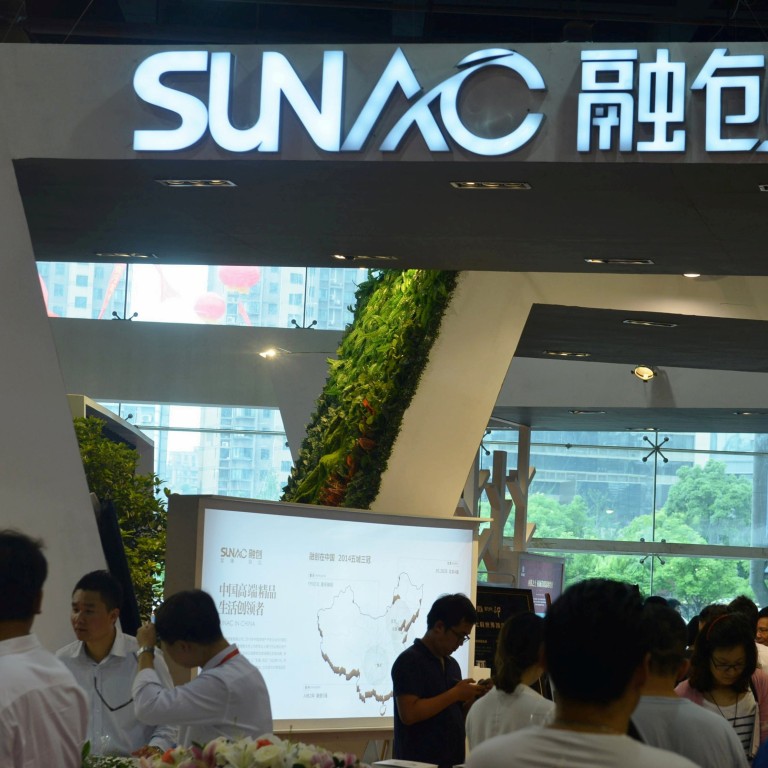
Real estate developers slammed after China reportedly tightens access to bond market funding
- CIFI Holdings, Sunac China and China Railway Construction Corporation are reportedly among companies facing restricted access to bond market
Shares of Chinese real estate developers were under pressure on Monday after reports that regulators plan to restrict access to funding through the bond market, reflecting the latest move to cool a property market that has been heating up since early this year.
The bond financing halt, could be a blow to developers who count on the bond market as a major financing channel, aside from direct bank loans, shadow banking and offshore funding.
The 40 top property developers monitored by Shanghai based Tospur Consultancy raised 47.3 billion yuan (US$6.9 billion) through corporate bonds in April alone, accounting for 63 per cent of the total funding.
“The regulators will always tighten liquidity if the market gets heated or companies become more aggressive. So in this case I won't say we are very surprised about the rumour,” said Adrian Cheng, a director with Fitch Ratings Asia Pacific Corporates.
He said the quantitative impact could not be measured as it is not clear how many developers are covered, and whether the restriction would also extend to offshore bonds.
Some Chinese developers that had been aggressive in land buying in past months will soon be temporarily blocked from accessing interbank and exchange-regulated bond markets, financial newspaper 21st Century Business Herald reported Saturday, citing officials. The National Association of Financial Market Institutional Investors, which regulates the interbank bond market, and the China Securities Regulatory Commission did not reply to emailed questions from the Post.
CIFI Holdings, a Hong Kong-listed developer ranked eighth nationwide in terms of land purchases in the first five months, is reportedly on the blacklist. Sunac China and China Railway Construction Corporation are also believed to be on the blacklist.
CIFI Holdings declined as much as 3.84 per cent in Hong Kong late Monday afternoon, while Sunac China fell 3 per cent. Evergrande, which didn’t appear in the list, lost 2.9 per cent.
“CIFI's land bank is getting quite small, though their short-term debt maturity isn't that big. They only have about two years of land bank life and therefore they do have a bit more pressure to buy land and will need more financing to do so,” said Cheng.
He said he is more comfortable with Sunac, given that it has enough resources to sell, and can still maintain liquidity if they don’t get too aggressive buying land.
Yan Yuejin, a research director with E-house China R&D Institute, said: “If the moratorium lasts long it could force developers to seek other higher-cost alternative financing channels and even cut selling prices to boost turnover.”
The marginal easing of onshore bond financing since the fourth quarter of 2018 led to a land acquisition binge in first and second-tier cities. stoking government fears of inflation in home price expectations. The housing ministry last month issued warnings to Suzhou, Foshan, Dalian and Nanning, second-tier cities that have seen brisk land and property sales. The banking regulator also warned banks against channelling funds to developers through the shadow banking sector.
“The bond issuing hiatus news not only affects companies on the blacklist, but also sends a strong signal throughout the sector that they should be careful in financing and land buying, given that more developers’ funding could be restricted,” said Zhang Hongwei, a research director with Tospur.
Zhang said the environment turned negative for developers in April, when funding of the 40 developers monitored by Tospur fell 26.4 per cent from March. The funding amount raised in May is expected to be in line with the April figure.
The latest curb has not affected developers’ home sales so far, as the combined turnover of the top 100 developers in May rose 8.8 per cent from April, according to CRIC data. But the year-on-year growth in sales has slowed to 5.7 per cent, down from 16.6 per cent growth in April.

